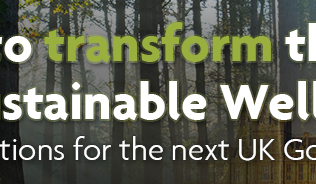In February, the Government published a consultation paper entitled Health and Harmony: the future for food, farming and the environment in a Green Brexit. This paper outlines the Government’s vision for post-CAP agricultural and environmental land management policy and seeks to collect the views of stakeholders on what these policies should look like.
This is a vital document, alongside the Government’s 25-Year Environment Plan, in determining the future of environmental policy in the UK post-Brexit.
The IES has recently responded to a Select Committee inquiry on this topic and is now working on our full response to Defra’s consultation. We are keen to hear the views of members and include examples and evidence from practising environmental scientists dealing with these challenges every day.
Below, we have outlined some of our key recommendations for government in this area. Let us know your thoughts, and if you agree with our analysis. We would also welcome submission of specific examples from your work which could help us to illustrate these points.
‘Public money for public goods’
Although lacking in detail, and despite some major weaknesses in Defra’s consultation strategy, this document does signal a welcome shift in thinking on land management policy, with a focus on “public money for public goods”. This is an approach wholeheartedly supported by the IES.
However, Defra’s consultation asks participants to rank the relative importance of various categories of public good (e.g. ’Improved soil health’ and ‘Improved water quality’). We consider this approach unhelpful: it over-simplifies the multi-faceted nature of the natural and human systems involved and the complex interlinkages between natural capital stocks and the ecosystem services which are derived from them. For instance, climate change mitigation is closely linked to soil health - a functioning peat moorland can be a net carbon-store (as well as helping to clean water, provide biodiversity and create cultural value).
Although it will be necessary to prioritise the delivery of certain public goods at scheme or local level, this must be done within a broad strategic framework based on a nuanced and holistic understanding of the complex socio-environmental systems concerned, and informed by science and evidence from the natural and social sciences and economics.

Do you agree with our analysis? Do you support the approach the Government has outlined?
Shifting from subsidy to investment
It is the position of the IES that in designing a future environmental land management policy it is beneficial to think in terms of ‘investments’, rather than ‘subsidies’. By explicitly treating payments as investments and linking them to the delivery of bundles of important ecosystem services (moving away from a system based primarily on subsidies for income support), payments could effectively drive positive and environmentally friendly land management practices that deliver a range of public goods and grow the natural capital base from which these goods and services flow. This could lead to a virtuous and expanding spiral, in stark contrast to historical trends.
It is important to recognise, however, that context matters: it is not possible - nor is it necessarily desirable - to try to deliver everything everywhere. Specific objectives, and the bundles of services and mechanisms which can deliver them in different locations, will need to be carefully considered drawing on all available evidence regarding the environmental, social and economic factors at play in particular places and landscapes.
For this approach to succeed, a nuanced, evidence-based understanding of the complex socio-environmental systems which deliver these goods (and their capital stocks and flows) is required. As such, we are urging the Government to consider public goods from agriculture in relation to the ecosystem services concept.

How should the government go about ensuring local priorities can be delivered within a strategic national framework? How can conflict be minimised and synergies maximised for greatest public and environmental benefit?
Rural-urban connectivity
Recognising the growing evidence which highlights that many people, located mainly in towns and cities, are not accessing or enjoying the benefits of a healthy natural environment, we suggest that the new scheme should more explicitly recognise the connectivity between rural and urban systems, and the impact land management can have beyond the immediate locale. Continued investment in rural areas traditionally associated with agri-environment programmes remains important, but we argue that the new policy framework should also promote schemes which can deliver benefits to a large number of people. This would mean ensuring that the scheme is able to support land management practices that improved natural capital in or close to towns and cities.

Do you support these recommendations? What examples best demonstrate the benefits this approach could deliver?
Science and evidence
The UK is a world-leader in environmental research, and to deliver on the vision of this paper, and the ambition of the Government’s 25-Year Environment Plan, the policy must be informed by the best scientific evidence and expertise.
We are calling on the Government to ensure that monitoring, research and evaluation are embedded in the new system at agri-environment scheme level, including a collection of baseline data and studies of specific interventions. This analysis should inform a process of continual learning and development as part of a system of adaptive management. We also argue that investment and monitoring must be significantly increased above the current level of less than 1% of agri-environment scheme value.

Do you support these recommendations? How can we ensure evidence and evaluation inform the continuing development and implementation of land management policy? Where is further research particularly needed?
Devolution
One of the most challenging issues for policymakers currently in developing post-Brexit systems and frameworks for managing our environment is devolution. Environment and agriculture are currently ‘devolved matters’, meaning the devolved institutions have responsibility for policy and regulation in this area. However, current, EU law effectively ensures common standards across the UK. After Brexit, it is possible this may change.
Although the devolved institutions have a strong track record of raising standards of environmental protection, we recognise a need to maintain common frameworks in some policy areas. As the IES has consistently highlighted, environmental processes do not respect political boundaries. As such, we recommend that the new environmental land management policy should be based on a shared set of principles and common UK (legislative) frameworks which have been co-produced to establish and ensure minimum standards (of, for instance, environmental protection and animal welfare). Within these frameworks, there must be the flexibility for individual devolved institutions to innovate and improve above and beyond these minimum standards.

Do you support this recommendation? Can you foresee any potential conflicts or problems arising from approaches diverging in this way? What examples could we draw on to further explore this issue?
Over to you…
Overall, the Government’s consultation paper offers promise in its proposed shift in approach, but also lacks detail and leaves many questions open. Elements of the consultation itself also raise concerns, but we should not overlook this opportunity to shape the future of environmental land management in the UK for the better. It is vital that environmental scientists feed into this process, and the IES looks forward to working with the Government to facilitate this exchange, and address this outstanding questions which this paper highlights. To help us do this, the views and expertise of our members are vital, so please do get in touch.
To submit comments, suggestions and examples to contribute to the IES response to this consultation, please email robert@the-ies.org by Thursday 3rd May.





